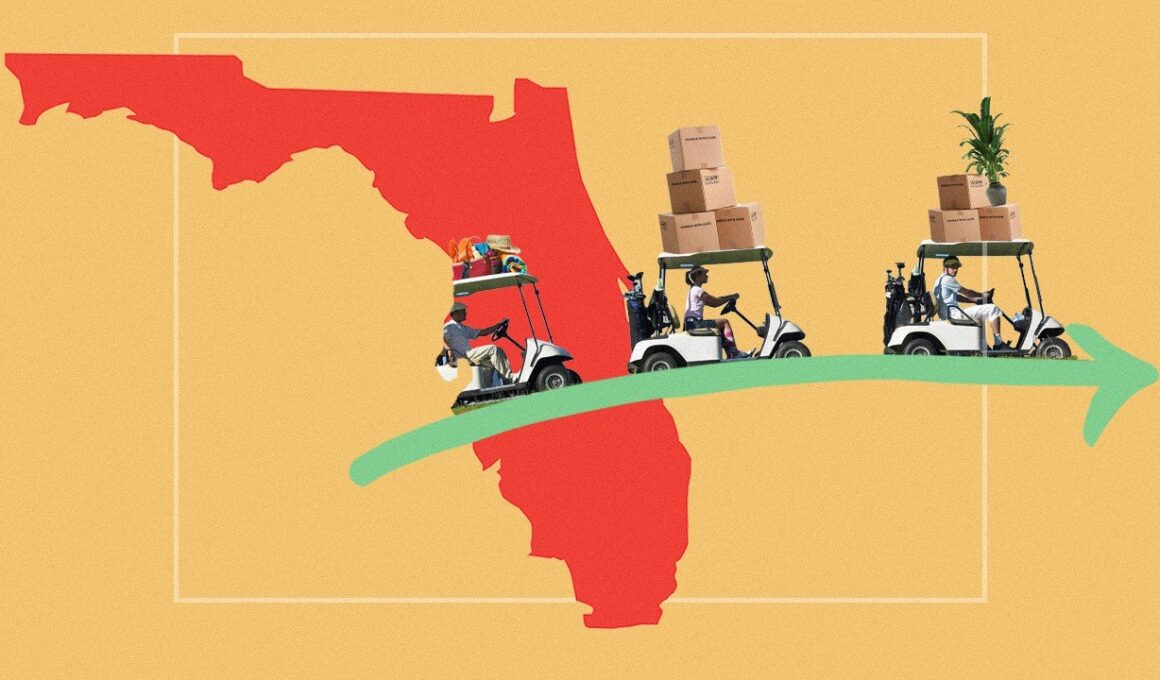Florida has long been a top state where retiring Americans flock to—but some, like local resident Alisa Newman, are doing the exact opposite.
Newman settled in the Miami area in 1997 when her husband got a job there. But now, at 58, she has decided to move out.
While she knows she will leave behind many of Florida’s retirement-friendly perks—such as no state income tax and year-round sunshine—she’s also painfully familiar with the area’s downsides.
For one, there’s the heat. While warm weather is widely seen as a draw to Florida living, the state has gotten hotter, with record-breaking temperatures.
“As I’m getting older, I’m not doing well with it,” she says. “At 6 a.m. it’s 80 degrees and humid.”

(Alisa Newman)
Then there are the hurricanes. Newman’s city of Coral Gables is regularly pounded by storms that have shut down power for weeks at a time. In 2017, Hurricane Irma tossed a tree onto her house.
“The storms are getting worse and worse, and people are in denial if they don’t want to see that,” she says.
In response to this surge in extreme weather, insurance costs have skyrocketed—and some of her neighbors can’t get it at all. Home insurance costs are up a whopping 102% since 2021—three times the national average.
Mark Friedlander of the Insurance Information Institute also told Fox13: “We’re going to see double-digit increases again in 2024. ”
“Everybody I know got massive rate increases last year or were dropped by their carrier,” laments Newman. Carriers “also want you to replace your roof if it’s over 20 years old, even if it’s in good condition.”
She says many friends are choosing not to pay premiums rather than suffer the high cost. Newman’s home insurance is a staggering $10,100 a year, and that is with discounts for hurricane windows and a burglar alarm.
She also has to worry about sinkholes: “Another fun Florida phenomenon.”

(Alisa Newman)
Newman adds that car insurance has also gone way up (24% on average in the state since 2023, according to the Insurance Information Institute), as have overall living expenses like eating out at restaurants—all of which work to put retirement further out of reach.
Additionally, home prices have surged since millions moved in during the COVID-19 pandemic. Since the Champlain Towers South condo building collapse in Surfside, which killed 98 people, HOA fees have almost doubled, according to the Miami Herald. The fees include not only ballooning insurance rates, but also the now-legally mandated reserve set aside for maintenance and repairs.
Newman, a freelance translator, still has some years to go before she plans to retire, but she hopes that moving somewhere more affordable will allow her to retire sooner.
Why Florida is no longer the best place to retire
While Americans from across the country still flock to Florida to retire, that’s slowly changing: Rising housing costs, skyrocketing home insurance rates, and extreme weather are forcing many to rethink their plans of retiring to the Sunshine State. Others who already live there are fleeing.
Floridians aged 65 and up move most often to Georgia, according to a recent analysis by Realtor.com®. But hot on its heels are Northern states such as New York, Ohio, Michigan, Pennsylvania, and New Jersey.

(Realtor.com)

(Realtor.com)
Why Delaware is attracting retirees
Newman is planning a move to Wilmington, DE, for retirement. She doesn’t know anyone there and is moving alone as her husband died six years ago. So why Delaware?
“I kept seeing it on these lists of best places to retire,” she says.
President Joe Biden might agree that The First State is an excellent choice. He has two homes there. WalletHub also ranked it No. 4 on its list of best places to retire. It also came in at No. 7 on the Realtor.com most walkable cities with affordable homes list.
Newman says the area’s walkability was a big factor in her choice.
“I drove around, and there were some really nice places to walk,” she says.
She can stroll to a downtown area with shops and restaurants, and there are plenty of parks. (The area received a 10 out of 10 on the Realtor.com parks ratings system.)
She can also drive to Delaware’s famed beaches like Rehobeth in a couple of hours. But she did not want to live directly on the water.
“With the climate stuff, I don’t think it’s a good idea,” she explains.
Additionally, she wants to experience cities with cultural attractions like Philadelphia and Boston, easily accessible by Amtrak, and to drive around small quaint towns in Pennsylvania and Maryland that have kept their historical charm.
“In Florida, it’s all strip malls,” she laments.
While her Florida neighbors were aghast that Newman was willing to move somewhere with cold, snowy winters, she’s heard from people in the Northeast that winters aren’t what they were 20 years ago.
“My brother lives in Syracuse, and he says they are not getting normal winters to the point where it’s scary,” she says.
There were also personal reasons for her choice: The state will make it much more convenient to drop in on her college-age children, who live in Connecticut and Baltimore. She could also more easily get to her elderly parents, who live in Manhattan. But she makes clear that the choice of state was for her, not her family.
“I don’t know where my kids will go after college,” she says. “Hopefully, they will stay on the East Coast, but that’s up to them.”
Additionally, she feels more in tune with the blue politics of the Northeast.
“When my husband and I first got to Miami-Dade County, it was a democratic stronghold,” she says. “But that has changed so much. I realize I’m bringing my blue vote to a state where it won’t matter, but I prefer to be around people who feel more like I do.”
Newman quickly zeroed in on a new development in Pike Creek Valley called Overlook at Linden Run, built by Eddy Homes. After owning an older house that was beginning to require a lot of maintenance, she preferred new construction.

(Realtor.com)

(Realtor.com)

(Realtor.com)
She put down 10% on a three-bedroom, 2.5-bathroom $620,000 townhome, and was able to order it to her specifications, requesting wood floors throughout rather than carpeting, a luxury primary bath, an upgraded kitchen and bathroom fixtures, and a security system. She also received $10,000 cash toward her closing costs.
Listing agent Alex Ercole Stackhouse, of the Gary Mercer Team, says the development of 17 units has been a big hit, selling out all but two units in a year.
While the idea of moving to a place where she doesn’t know anyone doesn’t daunt Newman, she says construction delays do. Her townhome was supposed to be delivered in October, but it has yet to break ground. Newman won’t list her house until she moves.
Stackhouse attributes the delay to increased county requirements, such as declaring a homeowners association. But she is expecting a first quarter 2025 delivery.
Newman acknowledges that leaving the country’s retirement mecca for her retirement is ironic, but declares she wouldn’t have it any other way. She just hopes she can be out of Miami by the next hurricane season.
“It will be so wonderful not to have to worry about that,” she says.








